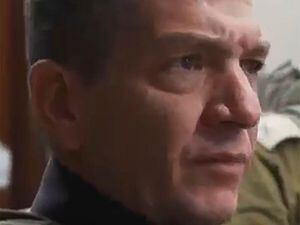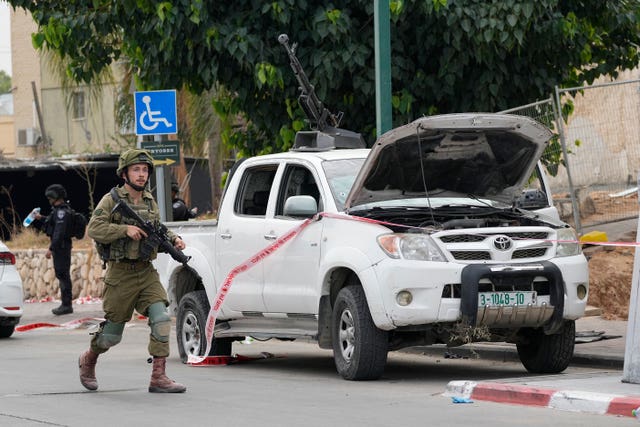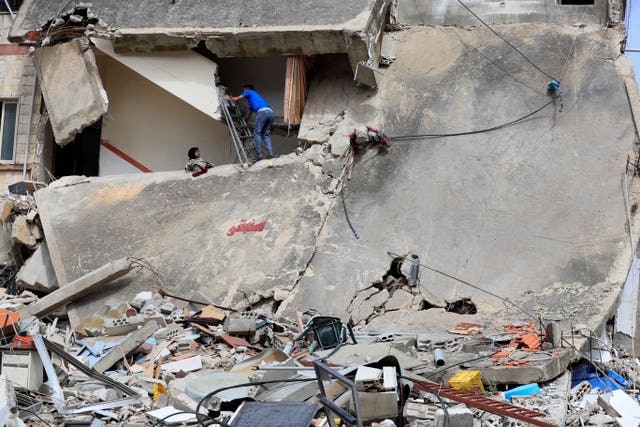Israeli military intelligence chief resigns over failure to prevent Hamas attack
Aharon Haliva has become the first senior Israeli figure to step down over the October 7 assault, which sparked the war in Gaza.

The Israeli military has said its head of intelligence has resigned over failures surrounding Hamas’s unprecedented October 7 attack.
Maj Gen Aharon Haliva has become the first senior Israeli figure to step down after Hamas breached the country’s defences, killing 1,200 people, mostly civilians, taking roughly 250 more captive, and sparking the war against Hamas in Gaza.
The official said shortly after the attack in October that he shouldered the blame for not preventing the assault.

His resignation could set the stage for more of Israel’s top security officials to accept blame for not preventing the attack and step down.
Maj Gen Haliva wrote in his resignation letter, which was provided by the military: “The intelligence directorate under my command did not live up to the task we were entrusted with. I carry that black day with me ever since, day after day, night after night. I will carry the pain with me forever.”
The intelligence chief and other military and security leaders were widely expected to resign in response to the glaring failures that led up to the October 7 attack.
But the timing of the resignations has been unclear because Israel is still fighting Hamas in Gaza and battling the Lebanese militant group Hezbollah in the north. Tensions with Iran are also at a high following attacks between the two enemies.
While Maj Gen Haliva and others have accepted blame for failing to stop the attack, others have stopped short, most notably Prime Minister Benjamin Netanyahu, who has said he will answer tough questions about his role but has not outright acknowledged direct responsibility for allowing the attack to unfold.
He has also refused to step down, even as a growing protest movement demands early elections.
Israeli opposition leader Yair Lapid welcomed Maj Gen Haliva’s resignation, saying it was “justified and dignified”.
“It would be appropriate for Prime Minister Netanyahu to do the same,” he wrote on the social media platform X.
The Hamas attack, which came on a Jewish holiday, caught Israel and its vaunted security establishment entirely off guard.
Israelis’ sense of faith in their military – seen by most Jews as one of the country’s most trustworthy institutions – was shattered in the face of Hamas’ onslaught. The resignation could help restore some of that trust.

With roughly 130 people still held captive in Gaza, Passover is certain to take on a more sombre hue this year: for many Israelis, it’s hard to fathom a celebration of freedom when dozens of people are still being held hostage.
“As we gather around the Seder table to commemorate and celebrate our journey from slavery to freedom, our hearts are heavy with the plight of the 133 Israelis who remain in captivity,” Mr Netanyahu wrote on X.
“Our resolve remains unyielding to see all hostages back with their families.”
The attack set off the devastating war that has killed more than 34,000 Palestinians in Gaza, according to local health officials, at least two-thirds of them children and women.
It has devastated Gaza’s two largest cities, and driven 80% of the territory’s population to flee to other parts of the besieged coastal enclave. The war has sparked a humanitarian catastrophe that has drawn warnings of imminent famine.
On Monday, Hezbollah fired dozens of rockets into northern Israel, drawing retaliatory strikes. The Israeli military said 35 projectiles were launched at one of its bases, without causing any casualties. It said it struck the sources of the rocket fire.
Hezbollah said its attack was in response to recent Israeli strikes on towns and villages in southern Lebanon.
The two sides have traded fire on a near-daily basis along the border since the start of the war in Gaza.
On Monday, Israeli police said that a car had slammed into pedestrians in Jerusalem, leaving three with light injuries. Security camera video showed two men exiting the car with a rifle before fleeing the scene. Police later said they arrested the two men.





